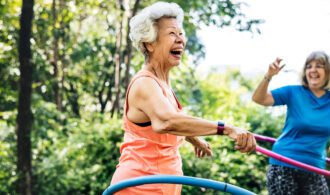Senior Health: Nutrition, Exercise, and Well-being
Maintaining good physical health is the foundation of a fulfilling life for seniors. In this article, we’ll cover a range of topics including nutrition, exercise, regular check-ups, and managing chronic conditions. Discover practical tips to keep seniors active, healthy, and enjoying life to the fullest.
Senior Health: Nutrition, Exercise, and Well-being
As we journey through life, the importance of maintaining good physical health becomes increasingly evident. For seniors, this holds even greater significance, as it lays the foundation for a fulfilling and enriching life during the golden years. In this article, we delve into the realm of senior physical health, exploring key aspects such as nutrition, exercise, regular check-ups, and the effective management of chronic conditions. Whether you’re a senior yourself or caring for an elderly loved one, these practical insights will help pave the way for an active, healthy, and enjoyable life.
The Cornerstones of Senior Health
1. Nutrition Matters
The adage “you are what you eat” rings especially true for seniors. Proper nutrition plays a pivotal role in maintaining overall senior health and vitality. As the body ages, its nutritional needs evolve. Senior health require a balanced diet rich in essential nutrients to support bone health, immune function, and energy levels.
Incorporate a variety of colorful fruits and vegetables to provide a spectrum of vitamins and minerals. Whole grains, lean proteins, and healthy fats should also grace the plate. Adequate hydration is often overlooked but remains essential. Drinking enough water supports digestion, circulation, and temperature regulation.
2. Staying Active Through Exercise
Regular exercise is a key component of senior health, promoting physical strength, flexibility, and mental well-being. Engaging in activities like walking, swimming, and yoga can enhance cardiovascular health and keep joints supple. Low-impact exercises are gentle on aging bodies while delivering substantial benefits.
Balance and strength training are particularly important for senior health, as they help prevent falls and maintain independence. Consult a healthcare professional before starting a new exercise regimen, ensuring that it aligns with individual capabilities and health conditions.
Tailored Approaches to Well-being
1. Mind and Body Wellness
Senior health isn’t solely about the physical; mental and emotional well-being play integral roles as well. Engaging in activities that stimulate the mind, such as puzzles, reading, or learning a new skill, can help maintain cognitive function. Additionally, fostering social connections combats feelings of isolation and depression.
Practicing relaxation techniques like meditation or deep breathing promotes emotional balance. These approaches not only reduce stress but also contribute to better sleep – a crucial component of overall well-being and good senior health.
2. Routine Health Check-ups
Regular medical check-ups are non-negotiable for seniors. These appointments help detect and address potential health issues before they escalate. Blood pressure, cholesterol levels, and blood sugar should be monitored regularly. Vaccinations, including those for flu and pneumonia, are also important to prevent illnesses that can be more severe in older adults.
Furthermore, routine eye and dental exams are often overlooked but are vital for maintaining quality of life. Vision and oral health greatly impact daily activities and should not be neglected.
Managing Chronic Conditions
1. Understanding Chronic Conditions
Many seniors manage chronic health conditions such as diabetes, arthritis, and heart disease. Understanding these conditions and following prescribed treatment plans is essential. Ignoring or neglecting medical advice can lead to complications that hinder both senior health and independence.
Family members and caregivers can offer invaluable support by educating themselves about these conditions and actively participating in their management. Open communication between seniors, healthcare providers, and caregivers creates a holistic approach to health maintenance.
2. Medication Management
For seniors with chronic conditions, medication adherence is crucial. Following medication schedules accurately and attending regular medication reviews with healthcare providers can prevent adverse reactions and ensure treatment efficacy. Organizing pills in pillboxes, setting alarms, or using medication management apps can aid in this process and positively contribute to overall senior health.
Embracing a Healthy Lifestyle
1. Hygiene and Fall Prevention
Maintaining good hygiene is not only essential for physical senior health but also for self-esteem and mental well-being. Regular bathing, dental care, and skincare routines should be upheld. Moreover, ensuring a safe living environment by removing tripping hazards and installing handrails can significantly reduce the risk of falls.
2. Embracing Technological Advancements
The digital age has brought forth numerous tools and devices that can enhance senior health and safety. Wearable fitness trackers can monitor physical activity, heart rate, and even remind seniors to stay hydrated. Smart home systems offer voice-activated assistance for tasks, medication reminders, and emergency calls.
In the tapestry of life, our senior years are chapters that deserve to be rich, vibrant, and fulfilling. By prioritizing nutrition, engaging in appropriate exercises, attending regular check-ups, and effectively managing chronic conditions, seniors can ensure they remain active, independent, and healthy. This journey is not solely an individual one – families, caregivers, and healthcare providers all contribute to weaving the fabric of senior well-being. As we embrace the wisdom that comes with age, let us also embrace the strategies that promote a life of vitality and joy, all critical components of good senior health.
Contact us here with questions about Generations’ independent living options.Book a tour at a Generations Community near you.



